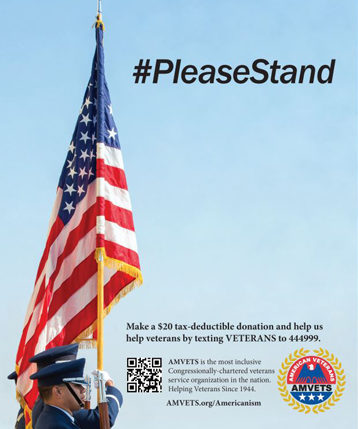NFL Faces Ad-versity from Vets’ Group
The NFL can’t afford more bad publicity, but that’s exactly what they’re getting after their latest clash with veterans. You’d think the league’s abysmal ratings would have them rethinking their business model. Not so far, according to Fox News’s Todd Starnes. Instead of shying away from the anti-Americanism that’s hurting them, the NFL is embracing more!
As if five months of anthem controversy isn’t enough, Commissioner Roger Goodell is heading into the league’s biggest game with a black cloud hanging over the sport.
Its relationship with the military already on shaky ground, Goodell didn’t exactly further the peace process when he blocked American Veterans (AMVETS) from airing a Super Bowl ad on patriotism. The ad (you can watch it here) includes a two-word message: “#PleaseStand.”
“It’s a simple, polite request that represents the sentiment of our membership, particularly those whose missing or paralyzed arms or limbs preclude standing,” group National Commander Marion Polk explained.Apparently, the NFL didn’t take it that way and rejected the ad outright. The Super Bowl, insisted league spokesman Brian McCarthy, “is designed for fans to commemorate and celebrate the game, players, [and] teams” — not, apparently, the men and women who guard the freedom that makes that celebration possible. “It’s never,” McCarthy said with a straight face, “been a place for advertising that could be considered by some as a political statement.”
Is that so? Where was McCarthy last year when the ads were so political that they made more headlines than the actual game? For corporate heavyweights like Google, Coca-Cola, 84 Lumber, Budweiser, and Airbnb, staying on the sidelines in the early days of the Trump administration wasn’t an option for Super Bowl LI. They left product placement in the rearview and opted for controversial statements on everything from immigration to sexuality. “We all belong. The world is more beautiful the more you accept,” Airbnb insisted. Google squeezed in plenty of subliminal messages — and some not-so-subliminal rainbow flags.
Then there was 84 Lumber, who didn’t win over a lot of conservatives with its attack on Trump’s immigration crackdown in its commercial bashing of a Mexican border wall. “There is an example of an unsophisticated advertiser making a political statement, and not really caring whether it helps them sell any lumber,” said Allen Adamson, founder of Brand Simple Consulting. Then, of course, there was Audi, which tried to make a statement about equal pay — only to be outed for having an all-male board.
As usual, the only thing more astounding than the NFL’s censorship is its hypocrisy. And since when did honoring the flag become a political statement anyway? It used to be just good manners. “Perhaps Goodell was concerned that a ‘political statement’ in the game-day program might take away from the ‘political statements’ being made on the football field when players take a knee,” Todd suggested. And for all of its radical politics, Polk points out, the NFL certainly doesn’t mind exploiting the military when it’s convenient. “Veterans are good for more than just military aircraft flyovers, photo opportunities during halftime, or props to sell camouflage-style NFL apparel, although the NFL’s stance… says otherwise.”
If there’s room for the “free speech” of Colin Kaepernick, then surely there’s room for the majority of Americans who are disgusted by his display. “Freedom of speech works both ways,” Polk warns. “We respect the rights of those who choose to protest, as these rights are precisely what our members have fought — and in many cases died — for. But imposing corporate censorship to deny that same right to those veterans who have secured it for us all is reprehensible and totally beyond the pale.”
Tony Perkins’ Washington Update is written with the aid of FRC senior writers.
RELATED ARTICLES:
Christianity Gets a Faith Lift… from Harvard
Have States Thrown in the Towel on Bathrooms?



Leave a Reply
Want to join the discussion?Feel free to contribute!